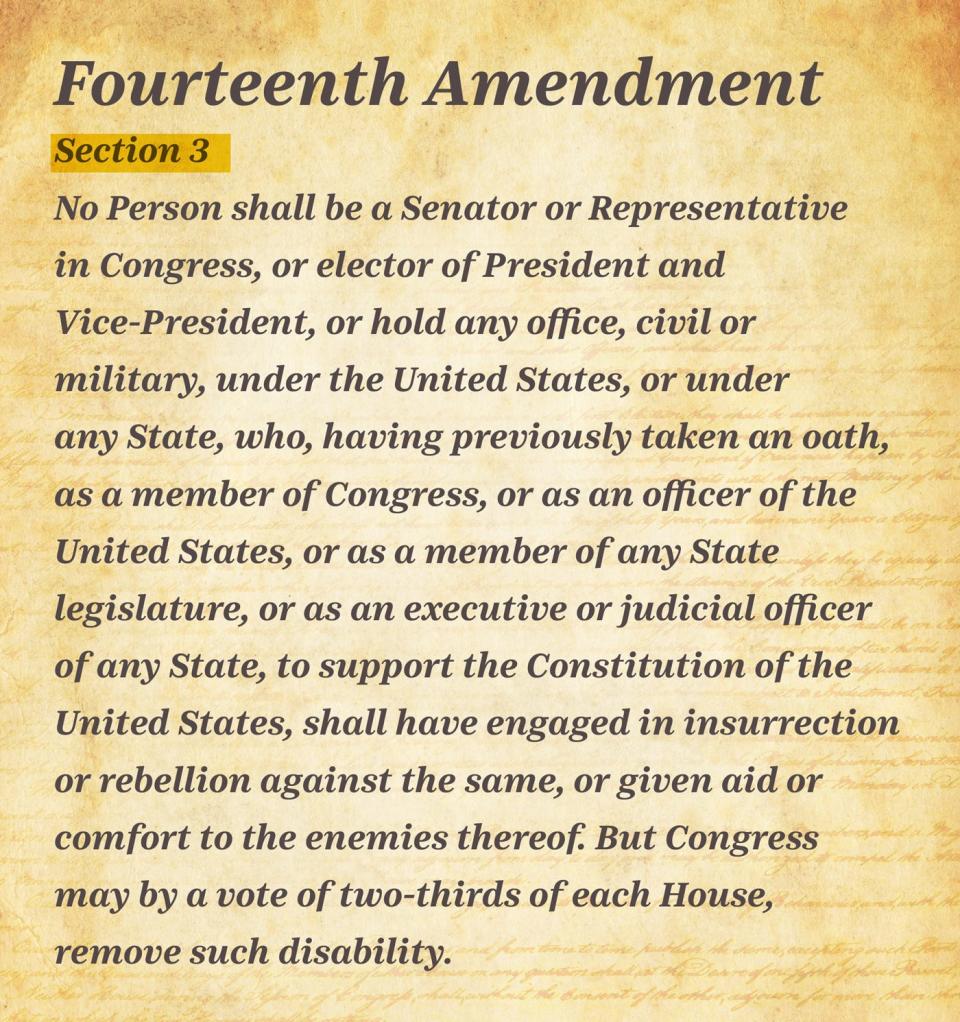What the Fourteenth Amendment actually says and how it has influence the law | Opinion
Editor's note: This is a regular feature on issues related to the Constitution and civics written by Paul G. Summers, retired judge and state attorney general.
Legal treatises have been written about the Fourteenth Amendment. We shall explore the most referenced subpart, Section 1. The other three substantive sections deal with representative apportionment among the states; officers debarred from serving if they engaged “…in insurrection or rebellion…”; and the public debt. The last section involves Congress’ delegated power to enforce the amendment by appropriate legislation.
Ratified in 1868, the amendment at Section 1 provides:
“All persons born or naturalized in the United States…are citizens of the United States and of the State wherein they reside. No State shall make or enforce any law which shall abridge the privileges or immunities of citizens of the United States; nor shall any State deprive any person of life, liberty, or property, without due process of law; nor deny to any person within its jurisdiction the equal protection of the laws.”
Hear more Tennessee Voices: Get the weekly opinion newsletter for insightful and thought provoking columns.
The amendment applies to all the states
I have served as district attorney, appellate and senior judge, and attorney general of Tennessee. I have observed the 14th Amendment cited in cases more than any other amendment or article of the Constitution. This is true whether in state or federal cases.
This amendment declares that most of the Bill of Rights apply not only to the federal government but to all the States as well.
Please recall that amendments, part of the Constitution, are the supreme law of the land. The Constitution and amendments supersede every law, including federal law and state constitutions.
States’ citizens and inhabitants have the same privileges and immunities as under the federal jurisdiction. No state may deprive anyone of life, liberty or property without due process. Likewise, no person may be deprived by the state (or federal) government equal protection of the laws.
Bitterly opposed by many of the former defeated Confederate states after the Civil War, the 14th Amendment was finally ratified so that all states could have representation in the Congress. One of the Reconstruction Amendments, it originally was used to address the former slaves’ rights.

Sign up for Latino Tennessee Voices newsletter:Read compelling stories for and with the Latino community in Tennessee.
Sign up for Black Tennessee Voices newsletter:Read compelling columns by Black writers from across Tennessee.
The amendment has influences elections and marriage rights
Section 1 of the amendment has encompassed cases such as Bush v. Gore (2000), which addressed the presidential election of 2000. The amendment has been cited in a multitude of cases.
They range, as just a few examples, from racial segregation, interracial marriage, same-sex marriage and the death penalty.
The Fourteenth Amendment has been cited by many cases to implement both substantive and procedural due process.
Substantive due process, for example, would be the right to marry someone of a different race. See Loving v. Virginia (1967) from the U. S. Supreme Court. Procedural due process examples are the right to counsel in criminal cases and the burden of proof of “clear and convincing evidence” in cases involving parental rights.
We shall continue our study of the Constitution in the next article about Amendment XV.
Paul G. Summers is a lawyer. He is a former appellate and senior judge, district attorney general, and the attorney general of Tennessee. Raised in Fayette County, Judge Summers resides in Holladay and Nashville.
This article originally appeared on Nashville Tennessean: Constitution: Here's what the 14th Amendment actually says and does

